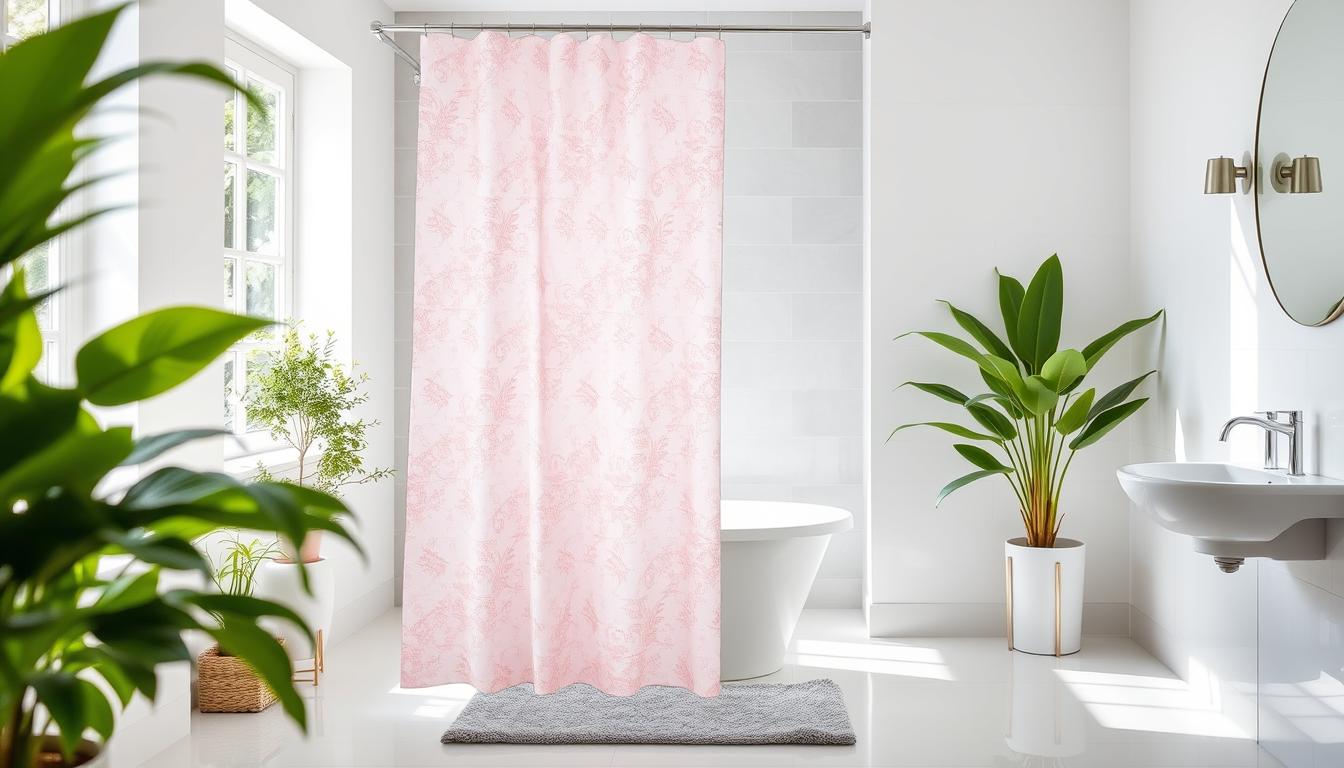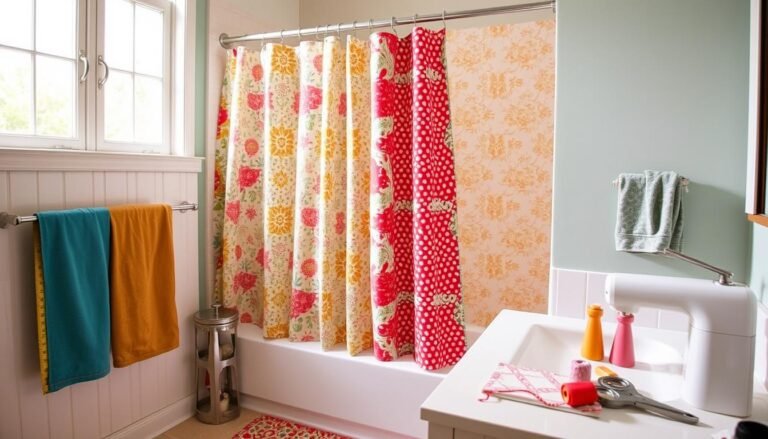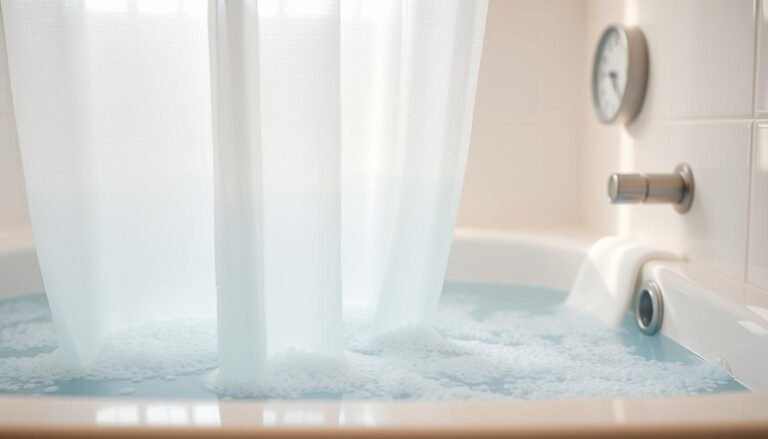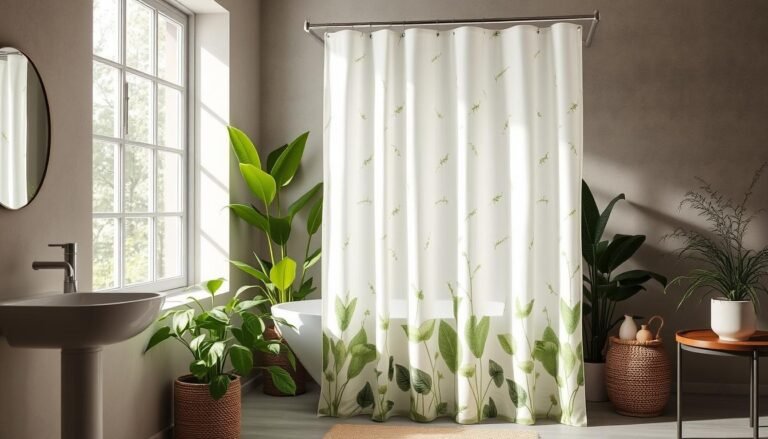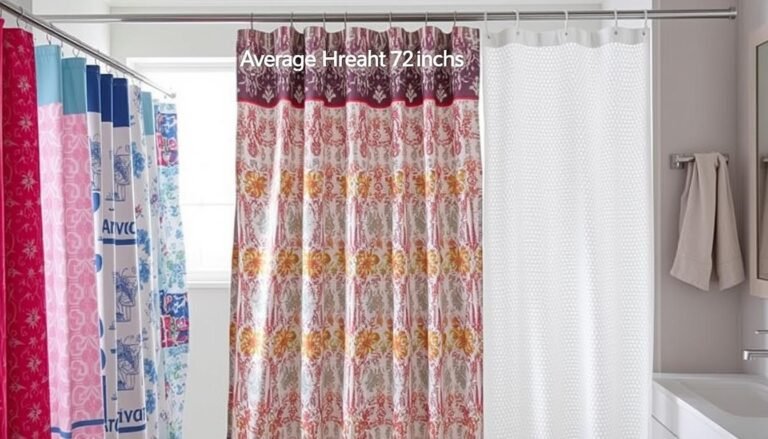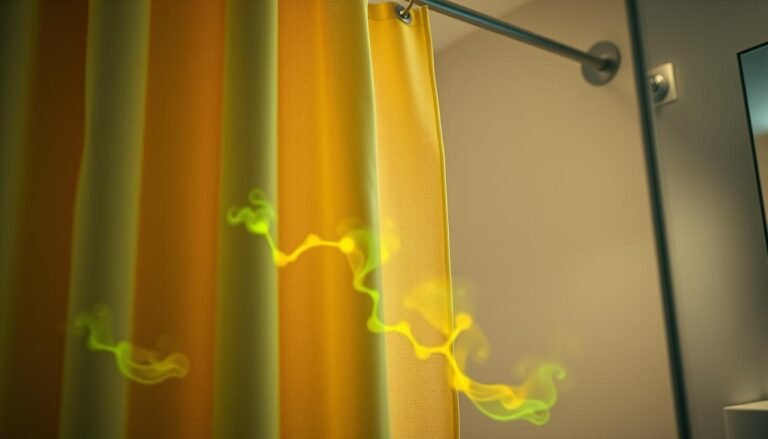Do Cotton Shower Curtains Work? Benefits & Care Tips
Looking to improve your bathroom essentials? Cotton shower curtains are a top pick. They make your bathroom look classy. They’re also safer and greener than PVC curtains. Alex Scranton, a science expert, says PVC curtains let out bad chemicals. But, cotton curtains lower the risk of harmful exposure, making them a smart choice for your health.
Cotton shower curtains win big with their looks and easy care. They soak up water well, which helps stop bathroom floods. Plus, you can clean them in the washing machine. This matches what today’s buyers want: products that are good for them, easy to care for, and eco-friendly.
More and more people want non-toxic and green products for their homes. This has made cotton shower curtains very popular. Brands like Anthropologie and Lush Decor have great cotton curtains. You can find styles like the Kye Organic Cotton Shower Curtain and Striped Blue & White Cotton Curtain. It’s easy to see why everyone loves these eco-friendly options.
Understanding the Effectiveness of Cotton Shower Curtains
Cotton shower curtains bring a natural touch to bathrooms. They mix beauty and purpose safely. To choose wisely for your space, knowing about cotton and comparing it to vinyl is key.
Materials Used in Fabric Shower Curtains
Different fabrics like cotton, polyester, and nylon are used for shower curtains. Each has its perks.
- Cotton: Soft and airy, it makes bathrooms look better. But, it must be cleaned often to prevent mold.
- Polyester: It’s tough and resists water well, meaning less laundry.
- Rayon and Nylon: These are light and help curtains dry fast.
Cotton and hemp are natural and safer. They keep harmful chemicals away, offering a healthier setting.
Comparison with Vinyl Shower Curtains
Fabric and vinyl shower curtains differ a lot in safety and eco-friendliness. Vinyl curtains are cheap but release over 100 dangerous chemicals. These can cause serious health issues, like damage to the liver.
| Aspect | Vinyl Shower Curtains | Fabric Shower Curtains |
|---|---|---|
| Health Risks | Emit VOCs and phthalates | Non-toxic, safer for health |
| Environmental Impact | Release toxins during degradation | Eco-friendly natural materials |
| Maintenance | Minimal, but accumulates toxins | Requires regular cleaning |
| Cost | Very affordable | Moderately priced, wear over time |
PEVA and EVA curtains are pricier than PVC but healthier. They let out fewer VOCs and lack chlorine. Cotton curtains are safe and eco-friendly, combining fashion and function without harming your health.
Benefits of Cotton Shower Curtains
Cotton shower curtains have many advantages. They are eco-friendly and perfect for those who care about the planet. Let’s explore the key benefits for health, the environment, and your home’s look.
Health and Environmental Benefits
Choosing cotton curtains over vinyl reduces harmful exposures. Vinyl contains PVC, phthalates, and metals that can hurt the liver and more. Cotton curtains don’t have these toxins, making your home safer.
Cotton is also good for the planet. It’s biodegradable and comes from renewable sources. Brands like Parachute use organic cotton, which is better for the earth. This choice cuts down on plastic waste from synthetic curtains.
Aesthetic Appeal and Customization
Cotton curtains are nicer to look at than plastic ones. You can get custom ones from 3HLinen on Etsy or choose various sizes from The Vermont Country Store. This makes it easy to find curtains that fit your style and bathroom.
Cotton is also soft and adds luxury to your bathroom. You can pick from different textures like linen or hemp. They are easier to clean too. This makes cotton curtains a great choice for stylish, health-conscious, and eco-friendly homes.
Reasons to Choose Cotton Shower Curtains
Looking at why to pick cotton shower curtains, we see it’s about more than style. It’s a move towards a greener bathroom. Cotton curtains offer that eco-friendly touch every bathroom needs. They feel luxurious and look elegant, unlike vinyl curtains known for their toughness.
Being able to wash these curtains easily at home adds to their allure. You can clean them in the washing machine with cold water. This keeps them looking and smelling fresh. By choosing cotton, you avoid the bad effects of making vinyl, which helps the environment.
Cotton curtains protect floors from water if used right. Adding a good liner stops mold and extends their life. This shows how practical they are without losing style.
Feedback from users shows moving to cotton cuts down on plastic use, helping the planet. Reviews praise cotton curtains for being long-lasting and eco-friendly. They’re popular for their beauty and support for greener living.
How to Care for Cotton Shower Curtains
Caring for cotton shower curtains the right way keeps them fresh. Regular care not only looks good but also makes them last longer. This saves money on bathroom updates.
Cleaning and Maintenance Tips
Caring for cotton shower curtains means cleaning them monthly. To wash them, mix ½ cup of baking soda with a towel in the machine. Choose a gentle cycle with warm water. You can also hand wash them with baking soda and a bit of laundry detergent or dish soap. This method helps remove soap scum and mildew.
Preventing Mold and Mildew
It’s vital to stop mold on your shower curtains to keep your bathroom healthy. Good airflow stops mildew and bacteria from growing. Spray vinegar mixed with water often to fight mildew. Also, make sure to spread the curtains out so they dry well.
Handling Shrinkage and Sizing Issues
Shrinkage in fabric curtains is usual. Washing them before you first hang them up can lessen shrinkage. Use cold water and dry on low heat to keep their size. Buying curtains a bit bigger than needed may help since they might shrink over time.
Following these tips for cotton shower curtain care keeps your bathroom looking and feeling clean. You won’t have to constantly fight mold or worry about the curtains shrinking. For additional advice, check out this detailed guide.
Do Cotton Shower Curtains Work?
Does a cotton shower curtain really do the job? Absolutely. Cotton curtains are great because they’re non-toxic, soak up water, and clean easily. They’re also better than vinyl curtains.
Using PVC plastics for shower curtains can be bad for your health. Cotton curtains don’t have this problem. They are safer for your bathroom.
People who use cotton curtains love them. They find good deals at stores like Ross and TJ Maxx, paying about $5. Cotton is preferred over plastic. Hotels often use fabric curtains because they last long and look good. These can be washed with towels and hung to dry.
Users have shared helpful tips and clever ideas. A curved rod keeps the curtain away from you. Stores like Ikea and JC Penney sell curtains with special hems. These make the curtains hang better.
Worried about water getting out? Cotton curtains work well with a plastic liner. This setup blocks water effectively. Even though they might cost more at first, they are worth it in the long run.
Here’s how cotton curtains stack up against plastic liners:
| Feature | Cotton Shower Curtains | Plastic Liners |
|---|---|---|
| Health Safety | Nontoxic, Non-offgassing | Potentially toxic off-gassing from PVC |
| Washability | Highly Washable | Generally not wash-friendly; often disposable |
| Durability | Long-lasting with proper care | Less durable, often replaced frequently |
| Cost | Higher initial investment | Lower cost, often considered disposable |
| Aesthetic Appeal | Available in various designs | Limited design options |
Cotton shower curtains are definitely the better choice. They bring health benefits, are easy to care for, and have many designs. They show why choosing sustainable options is good, both practically and culturally.
Alternatives to Cotton Shower Curtains
Looking for something different from cotton shower curtains? There are many eco-friendly and useful choices. You can find options in both natural and synthetic materials. This means there’s something for every bathroom.
Linen and Hemp Options
Linen shower curtains are now more popular. They dry quickly and have a simple, elegant look. Many who care about the environment love them. Hemp is also great, lasting long and fighting off mold and mildew in airy bathrooms.
Both linen and hemp soak up water well. They bring a natural feeling to your bathroom’s look.
Non-Toxic Polyester and PEVA Liners
If you prefer synthetic materials, consider non-toxic polyester and PEVA liners. They’re perfect for damp places because they’re waterproof. Non-toxic polyester curtains look good and are safer than PVC ones.
PEVA liners are better for the planet than vinyl and don’t have chlorine. They’re also easy to keep clean and can resist mold with regular care.
- Fabric shower curtains: Regular maintenance and periodic laundering can increase their longevity.
- PEVA liners: Recommended for their non-toxic properties and maintenance-friendly nature.
- Glass shower doors: Though sleek and durable, they are a more expensive and less common option.
In summary, both linen and synthetic options like PEVA liners are great choices. Today, buyers can find shower curtains that are good for health and the planet.
User Experiences and Reviews
User experiences and reviews are key when looking at cotton shower curtains. They show us the mix of looks and usefulness. Many say they are better than plastic because they’re eco-friendly and safe. Plus, they make your bathroom look great.
Brands like Quince, Coyuchi, and Parachute get thumbs up for using organic materials. Outlines is also cool for recycling old liners, making shower care greener. People love how easy they are to clean. Plus, they dry quickly, stopping mold and mildew from growing.
Many talk about how you set them up and keep the air fresh. This really matters for cotton shower curtains. Brooklinen and Schoolhouse are liked for their simple set-up and perfect size. These choices bring beauty, green benefits, and great use to your bathroom.
Looking for a bathroom upgrade or eco-friendly options? User feedback on cotton shower curtains helps you decide. Searches often show their benefits in style and eco-friendliness. For deeper insights, check out the full user experiences here.

Hey there, I’m Alex Hanson and I’m passionate about all things covers! Whether you’re looking for a car seat cover to protect your vehicle or an oven cover to keep your kitchen clean, I’m here to help. With years of experience in the industry, I have plenty of knowledge and insights to share with my readers. So, if you care about protecting your belongings and making them look their best, you’re encouraged to read my blog as I explore the perfect cover for every need.

